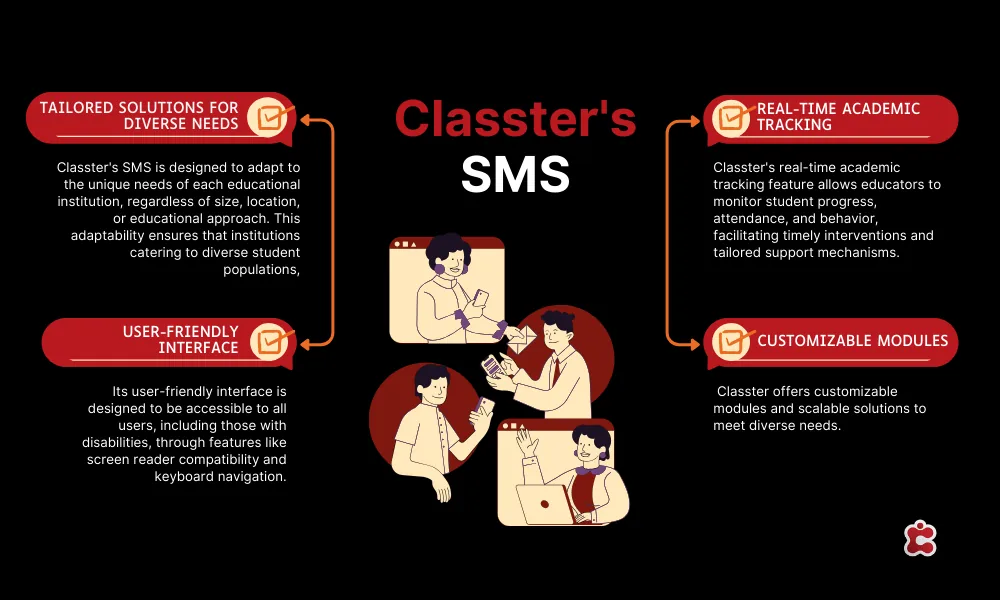When you think about higher education what comes to mind? It could be the pursuit of knowledge, personal and professional growth, or the vibrant exchange of ideas that characterizes academia. However, beyond the discussions and scholarly endeavors, there is a core belief that defines education; inclusivity. In today’s world, diversity and inclusivity are at the forefront of institutions globally. These concepts ensure that everyone has access to education and create an environment where each person feels appreciated, respected, and empowered to succeed. At the center of this effort lies the transformative power of technology, specifically, School Management Systems (SMS). These systems offer more than administrative functions; they serve as tools for promoting inclusivity within higher education establishments. Whether it’s ensuring accessibility for students with disabilities or providing support for a variety of learning needs SMS can be used as a driving force for change.

Understanding Inclusivity and School Management Systems
To define inclusivity in education means acknowledging and valuing the perspectives, experiences, and identities present among students, faculty members, and staff. It transcends just tolerance. Inclusivity, in education, involves accepting and celebrating differences in cultural, socio-economic, racial, ethnic, gender, sexual orientation, and ability-related aspects.
However, achieving inclusivity in higher education is not without its challenges:
- Lack of access to resources and support services
- Discrimination and prejudice
- Insufficient representation of marginalized groups
- Inflexible institutional policies and practices
- Physical, technological, or environmental barriers to accessibility
School Management Systems are tools for promoting inclusivity by addressing these barriers. While SMS are typically used for tasks and managing student information efficiently they also play a role in advancing inclusive practices in higher education. By utilizing their functionalities and adaptable structure SMS can support initiatives focused on diversity, equity, and inclusion.
Enhancing Accessibility and Accommodation with SMS
SMS can be customized with features to accommodate disabilities and learning preferences. One crucial factor involves incorporating tools, like screen readers, speech recognition software, and alternative input devices. These technologies help students with impairments, motor disabilities, or other challenges to access and engage with content. Customizing interfaces in SMS allows for adjustments in text size, contrast, and color schemes to improve readability for students with impairments or cognitive disabilities. Moreover, offering formats for course materials ensures that students with learning preferences can access information. This could include providing recordings or tactile graphics that cater to strengths and abilities.
Anonymized Application Review
The anonymized review processes in education play a role in promoting inclusivity by eliminating personally identifiable information such as names, genders, ethnicities, and other demographic details from student applications. This approach aims to reduce bias and ensure fairness in the selection process.
Integrating SMS into online application portals provides the framework, for anonymizing applicant data. With its data management features SMS enables the removal of personally identifiable information by replacing it with generic identifiers or placeholders systematically.
For instance, names could be substituted with codes gender references could be replaced with terms and ethnic details might be left out entirely. Embedding anonymization features directly into the application portal SMS workflow guarantees that applicant information remains anonymous upon submission. This approach helps reduce the chances of bias or discrimination during the evaluation process.
Promoting Fair Educational Opportunities
School Management Systems play a role in monitoring and addressing disparities in performance. They enable interventions and ensure fair access to educational resources, scholarships, and extracurricular activities. By tracking indicators like grades, attendance records and course completion rates SMS offers insights into the academic journey of students from various backgrounds. Through analytics, the system analyzes data and behavioral patterns to identify students who may be at risk of falling behind academically or dropping out. Early warning systems can then alert advisors and administrators to take action.
Additionally, by utilizing platforms institutions can simplify the application processes, for scholarships, grants, and financial aid programs. This guarantees that all students have opportunities to access these resources regardless of their background or situation.
Diversity through Inclusive Teaching
An aspect of utilizing SMS for promoting diversity and inclusive teaching practices involves integrating pedagogical strategies directly within the platform. Faculty members are supported with resources, training, and assistance to create and apply teaching methods. SMS features, like accessibility tools, multimedia integration, and interactive learning modules cater to learning styles. They can use SMS to include readings, case studies, and multimedia materials from social and disciplinary perspectives. SMS is crucial for promoting competence through inclusive curriculum design. It helps in addressing diversity, social justice, and equity issues in teaching. By incorporating viewpoints into the curriculum instructors prepare students for a world.
Institutional Policies and Accountability
To promote inclusivity in practices like admissions, curriculum development, student services, and faculty recruitment integrating inclusivity principles is vital. Implementing accountability measures is key to tracking progress towards inclusivity goals. SMS aids in this, by offering data analytics for monitoring inclusivity-related metrics.
Enhancing inclusivity, within institutions involves considering factors such as student retention and graduation rates the diversity of student and faculty demographics, and the availability of support services.

Classter’s School Management System
With operations in over 40 countries and 300,000+ daily active users, Classter demonstrates a deep understanding of diverse educational contexts and backgrounds. This global perspective informs the development of Classter’s SMS. This ensures that it addresses the unique challenges and opportunities associated with promoting inclusivity within higher education. Here’s how Classter’s SMS promotes inclusivity:
1. The cloud-based nature of Classter’s SMS allows for customization to meet the requirements of each school or college irrespective of their size, location, or teaching methodology. This flexibility ensures that educational institutions can accommodate students from backgrounds including those belonging to minority groups.
2. Featuring a user-friendly interface for students, teachers, administrators and parents alike underscores Classter’s commitment to inclusivity through ease of use. Ensuring individuals with varying tech skills can navigate the platform effortlessly promotes access, to information and resources.
3. The real-time monitoring tools embedded in the SMS empower educators and school administrators to track student performance metrics like attendance records and academic progress promptly. This allows for interventions and personalized assistance, for students who might be at risk of falling.
4. Classter’s SMS provides modules that can be adjusted to promote practices, such as offering accommodations for students with disabilities providing language support, and incorporating cultural sensitivity in curriculum design. With Classter’s platform institutions are empowered to establish an inclusive learning environment.
Are you looking to create inclusivity in your institution’s learning environment?
Discover the capabilities of Classter’s School Management System firsthand. Schedule a demo today to see how our cloud-based SMS can cater to your institution’s requirements no matter its size or location. Join the community of institutions championing inclusivity with Classter. Book your demo now!
FAQ’s
SMS streamline administrative tasks and provide tools for addressing barriers to inclusivity, such as accessibility accommodations and anonymized application review processes.
Look for SMS with accessibility tools, customizable modules, real-time academic tracking, and anonymized application review capabilities to support diversity and inclusion in higher education.
Classter’s SMS offers customizable modules, real-time academic tracking, and accessibility features to empower institutions in creating an inclusive learning environment.

